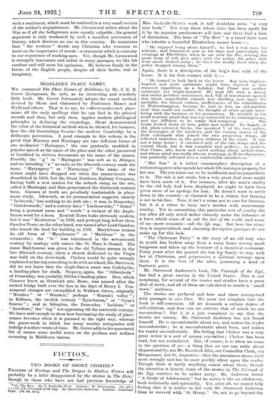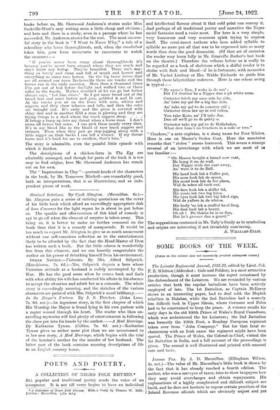FICTION.
TWO BOOKS OF SHORT STORIES.* READERS of Heritage and The Dragon in Shallow Waters will probably be a little disappointed by the stories in The Heir,' though to those who have not had previous knowledge of • (1) The Heir. By V. Saekville-West. London : W. Heinemann. [6s. net.] —,-(2) Us The Triumph of the Egg. By Sherwood Anderson. London : Jonathan
Care. . 6d. net.]
Miss Sackville-West's work it will doubtless seem "a very nice book." Yet even those whose taste has been spoilt for
it by its superior predecessors will here and there find a hint of distinction. The hero of " The Heir" is a timid little man who inherits a beautiful Elizabethan manor house :-
" He enjoyed being alone himself; he had a real taste for solitude, and luxuriated now in his days and particularly his evenings at Blackboys, when he sat over the fire, stirring the great heap of soft grey ashes with the poker, the ashes that were never cleared away ; ho liked the woolly thud when the poker dropped among them."
Again, there is a description of the heies first sight of the house. It is his first contact with it :- " He turned to look back at the house. Any man brighter- hearted and more optimistic might have rejoiced in this enforced expedition as a holiday, but Chase was neither optimistic nor bright-hearted. Ho took life with a dreary and rather petulant seriousness, and, full of resentment against this whole unprofitable errand, was dwelling now upon the probable, the almost certain, inefficiencies of his subordinates in Wolverhampton, because he had in him an old-maidish trait that could not endure the thought of other people inter- fering with his business or his possessions. He worried, in his small anaemic mind that was too restricted to be contemptuous, and too diffident to be really bad-tempereql. . . . The house looked down at him, grave and mellow. Its facade of old, plum-coloured bricks, the inverted V of the two gables, the rectangles of the windows, and the creamy stucco of the little colonnade that joined the two projecting wings, all reflected unbroken in the green stillness of the moat. It was not a largo house ; it consisted only of the two wings and the central block, but it was complete and perfect ; so perfect, that Chase, who knew and cared nothing about architecture, and whose mind was really absent, worrying, in Wolverhampton, was gradually softened into a comfortable satisfaction."
" Her Son " is a rather commonplace description of a widowed squiress who spends her whole life nursing a property for her son. The son turns out to be indifferent and unsympathetic to it. The tale is not crude, but a very great deal more might have been made of it. For instance, after the man's cruelty to the old lady had been displaYed, we ought to have been given more of an apology for him. He doesn't want to settle down in the country—is charmed to be a visitor, but farming is not in his line. Now, it isn't a crime not to care for farming, but it is a crime to treat one's mother with unnecessary cruelty. Yet in committing this particular sort of cruelty the son after all only acted rather clumsily under the influence of a force which some of us call the law of the world, and some of us—more romantic--call the life urge. But here the situa- tion is ungeneralized, and charming descriptive passages do not make up for this lack.
" The Christmas Party " is the story of an old lady who in youth has broken away from a smug home among small burgesses and taken up the business of a theatrical costumier.
Forty years after the quarrel she has he/ family to stay with her at Christmas, and perpetrates a spiritual revenge upon them. It is the best of the tales, possessing a kind of fantastic gusto.
Mr. Sherwood Anderson's book, The Triumph of the Egg', has had a great success in the United States. This is not surprising, for several of the stories and studies have a great deal of merit, and all of them are calculated to startle a " small town " audience.
The stories are prefaced and here and there interspersed with passages in sere libre. We must not complain that the book is self-conscious. All art demands a certain degree of self-criticism, and how can we criticize that of which we are unconscious ? But it is a just complaint to say that the stories are uneasy. Mr. Sherwood Anderson has not found himself. He is uncomfortable about sex, and makes his reader uncomfortable ; he is uncomfortable about form, and makes his reader uncomfortable. His feeling that Chekov was a very great writer is a sort of uneasy conviction ; Chekov has been read, but not assimilated. But, of course, it is when we come to the question of sex—a thing that no one can write about dispassionately, not Mr. Havelock Ellis, not Councillor Clark, not Maupassant, not St. Augustine—that the uneasiness shows itself most strongly and has its most prickly effect upon the reader.
Though there is rarely anything coarse about them, though the intention is honest, some of the stories in The Triumph of the Egg contrive to be rather nasty. Mr. Anderson writes " A Study of Adolescence," but he writes it like an adolescent, both technically and spiritually. Yet, after all, we cannot help feeling that it is nobler to fail with Mr. Sherwood Anderson than to succeed with "0. Henry." Or, not to go beyond the books before us, Mr. Sherwood Anderson's stories make Miss Sackville-West's easy writing seem a little cheap and obvious.; and here and there in a study, even in a passage where he has succeeded, Mr. Anderson atones for the rest. The most success- ful story in the book is " I Want to Know Why," a tale of a schoolboy who loves thoroughbreds, and, when the teanderlust takes him, goes from racecourse to racecourse to watch the creatures :-
" If you've never been crazy about thoroughbreds it's because you've never been around where they are much and don't• know any better. They're beautiful. There isn't any- thing so lovely and clean and full of spunk and honest and everything as some race horses. On the big horse farms that are all around our town Bockersville there are tracks and the horses run in the early morning. More than a thousand times I've got out of bed before daylight and walked two or three miles to the tracks. Mother wouldn't of let me go but father always says, ' Let him alone.' So I got some bread out of the bread box and some butter and jam, gobbled it and lit out. At the tracks you sit on the fence with men, whites and nigger's, and they chew tobacco and talk, and then the colts are brought out. It's early and the grass is covered with shiny dew and in another field a man is plowing and they are frying things in a shed where the track niggers sleep. . . . It brings a lump up into my throat when a horse runs. I don't mean all horses but some. I can pick them nearly every time. It's in my blood like in the blood of race track niggers and trainers. Even when they just go slop-jogging along with a little nigger on their backs I can tell a winner. If my throat hurts and it's hard for me to swallow, that's him."
The story is admirable, even the painful little episode with which it finishes.
The descriptions of a chicken-farm in The Egg are admirably managed, and though for parts of the book it is too easy to find origins, here Mr. Sherwood Anderson has struck out on his own.
The " Impressions in Clay "—portrait heads of the characters in the book, by Mr. Tennessee Mitchell—are remarkably good, both as interpretations, that is as illustrations, and as inde- pendent pieces of work.



































 Previous page
Previous page